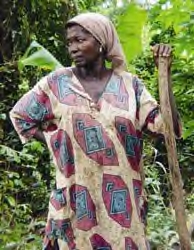
Helena Bempong: cocoa farmer, Kuapa Kokoo Cooperative member, Day Chocolate Company owner. (Photo: Phil Grout �2003)
Oct. 15, 6 p.m.
fair trade chocolate tasting
Park Slope food co-op
782 union street (betw. 6 & 7)
Bklyn
non-members welcome.
It is hard to imagine that there are people anywhere on the face of the earth who have not experienced the joy of rich chocolate melting slowly in their mouths. It is even more incredible to realize that many of those people live in places like Ghana, where much of the world's cocoa is produced. The simple fact is that these people are too poor to afford what we consider a simple treat.
This fundamental inequity is not a result of our working harder or longer or even smarter than people in developing countries. It is a direct result of the fact that people in the industrial north control the means of production and distribution. They own the system and as a result receive the vast majority of the benefits. It is also a result of a continuing oversupply of many commodities like cocoa caused by the lack of other employment opportunities in the very poorest countries, particularly Africa.
Fair trade standards and labels have been one response to this situation. F L O is the worldwide Fairtrade Standard setting and Certification organisation. It permits more than 800,000 producers, workers and their dependants in 50 countries to benefit from labelled Fairtrade.
FLO guarantees that products sold anywhere in the world with a Fairtrade label marketed by a National Initiative conforms to Fairtrade Standards and contributes to the development of disadvantaged producers and workers. (FLO) sets standards which establish a minimum fair price for agricultural products like cocoa, coffee, and bananas. In our country, these standards are monitored by FLO affiliate TransFair USA.
Coffee farmers throughout the developing world have benefited greatly from the fair trade label during the last decade. Now fair trade standards have been expanded to cocoa and chocolate.

No comments:
Post a Comment